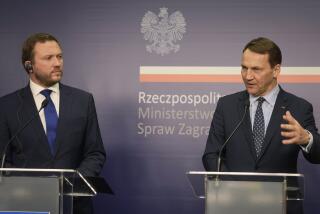Estonia ‘Sovereignty’ Leads to Summons From Moscow
MOSCOW — The Kremlin on Thursday summoned the leaders of Estonia to Moscow and, in a terse, carefully worded statement, called the tiny Baltic republic’s dramatic bid for sovereignty “inconsistent” with the Soviet constitution.
Within hours, Estonian President Arnold Ruutel was en route to the Soviet capital, along with the republic’s new premier, Indrek K. Toome.
Ruutel, who has called for calm, left the Estonian capital of Tallinn after a televised statement in which he called Moscow’s response “logical because what we have done . . . is something new in the Soviet Union.”
An emergency session of the Estonian Supreme Soviet, or Parliament, on Wednesday overwhelmingly passed a constitutional amendment requiring Estonian approval of any new Soviet law.
The legislators also approved a “declaration of sovereignty” that declares the republic’s independence in all areas except defense and foreign affairs. They also rejected changes to the federal constitution proposed by Soviet President Mikhail S. Gorbachev, saying they would reduce Estonian autonomy.
The action, which came under the banner of Gorbachev’s reform effort, nevertheless was an unprecedented challenge to Kremlin authority that threatened to spread to other areas.
Moscow’s initial reaction came in a statement issued by the Presidium of the Supreme Soviet, the national Parliament, that said the Estonian decisions were “inconsistent with the existing constitution of the U.S.S.R.”
The Soviet news agency Tass later reported that committees of the Supreme Soviet were ordered to prepare an analysis of the issue, which it said “affects the initial principles of the building and unity of the Soviet socialist federation.”
It did not say when the meeting would take place, but presumably it would be before the Supreme Soviet goes into session again Nov. 29.
In Washington, State Department spokesman Charles Redman said the United States, which has never recognized the forcible annexation of Estonia, Latvia and Lithuania into the Soviet Union in 1940, “supports the legitimate aspirations of the Baltic people and their right to seek redress for their grievances.”
Residents of the westward-looking Baltic republics have been pushing for greater economic and cultural freedom from Moscow under Gorbachev’s policy of perestroika , or restructuring.
They have been especially angered by Gorbachev’s proposed amendments to the national constitution, which they say would shift to Moscow what little power they have and eliminate their constitutional right to secede.
The three republics were independent countries between the world wars and were annexed by the Soviet Union in 1940 after a 1939 agreement between the Soviets and the Nazis.
There have been signs of Kremlin impatience with the Baltic nations. Politburo member Alexander N. Yakovlev, believed to be Gorbachev’s closest adviser, said in an interview last month that they will not be allowed to take any major steps toward independence.
Yet on Thursday, thousands of Lithuanians gathered outside their Parliament building with banners and flags and watched on live television as their legislators convened a session at which they were scheduled to take up a declaration of Lithuanian as the republic’s official language, and other legislation that would follow Estonia’s action.
There seemed to be optimism in Estonia that Moscow would not take a hard-line approach.
“Of course Gorbachev will be angry at first, but I think that when he thinks about it, he’ll realize we have supported the perestroika reforms more deeply than he expected,” said Marju Lauristin, a key leader of the Popular Front of Estonia, the mass democratic movement that has been the driving force behind the republic’s political activity.
Estonia’s Communist Party chief, Vaino Valjas, took a conciliatory line in an interview with Estonian television, distinguishing between outright rebellion--”which this was clearly not”--and the “legal assertion of sovereignty and democracy.”
Toome, the republic’s premier, laughed nervously when he was asked by reporters how he thought Gorbachev would handle the crisis.
“There is great hope. Reform is a matter of hope. But, of course, every hope has moments of unease,” he said, before leaving for Moscow. “We’re taking a new road. In Estonia, we’re the pioneers.”
He refused to predict what would happen, however.
More to Read
Sign up for Essential California
The most important California stories and recommendations in your inbox every morning.
You may occasionally receive promotional content from the Los Angeles Times.










